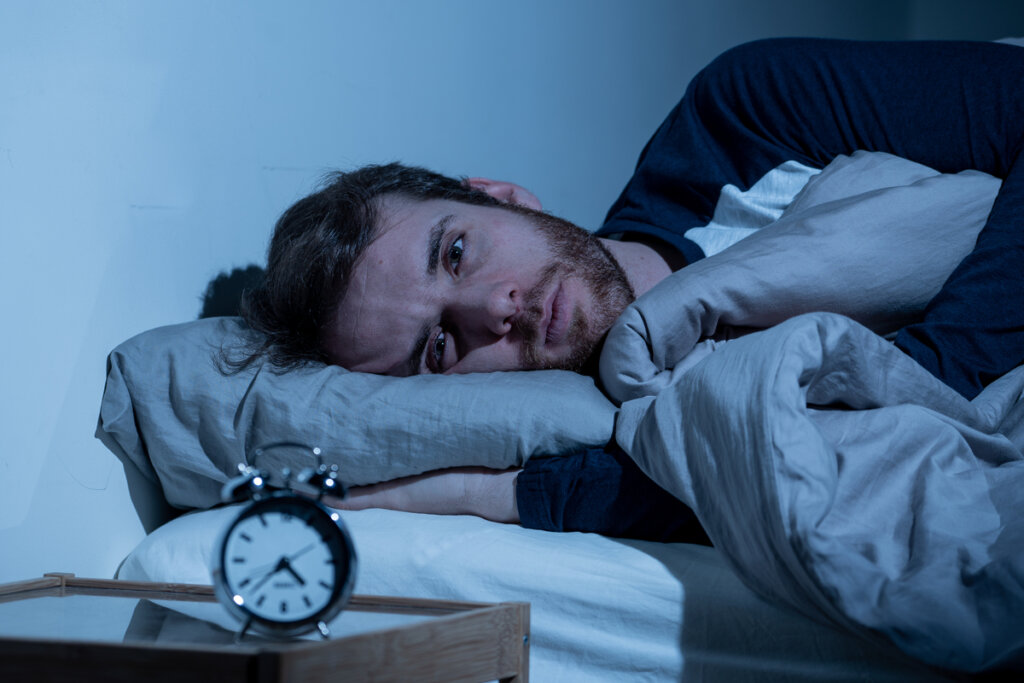Why Do You Wake Up at the Same Time Every Night?


Written and verified by the psychologist Valeria Sabater
It’s 3.30 am, and your eyes suddenly open automatically. Why do you wake up at the same time every night? As a matter of fact, many people find themselves asking the same question. It seems that our sleep cycles are suddenly interrupted at a certain time. It’s as if our brains have internal alarms that force them to suddenly move from the dream world to consciousness.
Some attribute this periodic awakening to supernatural or even spiritual factors. Others think it’s due to anxiety. According to Chinese medicine, the explanation may lie in the purification cycles carried out by the body. Indeed, there’s no shortage of theories and speculations on the subject. However, one thing is clear: any interruption of rest during the night translates into exhaustion and discomfort.
We can’t ignore that these sudden and chronic awakenings fall within the classification of sleep disorders. If it’s sufficient to affect your quality of life, there are some strategies you can try that’ll help you enjoy deep and continuous sleep.
So let’s find out what lies behind this phenomenon and what you can do about it.

Why do you wake up at the same time every night?
Any awakening in the middle of the night or the simple fact of waking up hours before your usual time counts as a sleep disturbance. Maybe you’re one of the lucky ones who can get back to sleep afterward. However, as a rule, it’s pretty difficult to return to a deep sleep. This translates into a gradual deterioration of your physical and psychological balance.
Soon, it’ll start to cause you memory and concentration problems. You’ll experience the kind of mental fog caused by insomnia and, of course, the risk of suffering from a health problem. Therefore, if you’re waking up every night at the same time, you need to realize you may have a problem.
This will be more likely if it takes you longer than half an hour to fall back to sleep.
The hypnogenic state
The form and characteristics that define each phase of this period are known as sleep architecture. Each of these stages goes through a phase of wakefulness, then drowsiness, light sleep, slow sleep phase III, and, finally, the REM phase.
One of the reasons why you always wake up at the same time could be because of the hypnogenic state. This is the moment between the end of one cycle and the beginning of a new one. In fact, the passage from sleep to wakefulness.
- If you always go to bed around the same time, it’s possible that your first cycle also ends at the same time of the night.
- Interestingly, some people wake up for a few seconds and then turn over and continue sleeping. Others wake up completely and the first thing they do is look at the time.
Insomnia in the middle of the night
Middle-of-the-night insomnia is a sleep disorder that’s also defined as biphasic sleep. It consists of a sudden interruption in the middle of the rest cycle, causing the night to be divided into two parts. Its origin lies in an alteration of melatonin, the hormone that facilitates night sleep.
This unexpected awakening almost always occurs at the same time.
Anxiety and alertness
When you go through times of high stress and anxiety, it’s common to experience night awakenings. Moreover, you may well always wake up at the same time. Why is this?
In general, people suffering from anxiety disorders experience high levels of physical and emotional activation that accumulate during the day and remain dormant at night.
However, this hyperarousal doesn’t just stick to the body. The brain is always in a state of alert. It gives you the feeling that you must either escape or defend yourself from something. For this reason, high anxiety may make you wake up in the middle of the night, drenched in sweat, with tachycardia, and a feeling of suffocation.
The fact that your time of waking is more or less the same every night is because your mind has got used to bringing you back to consciousness at this hour.

Health changes
If you’re waking up at the same time every night on a recurring basis, you should visit your doctor. You need to consider that there may be some physiological changes that are orchestrating these sudden awakenings.
It could be caused by the following conditions:
- Sleep apnea.
- Gastroesophageal reflux.
- Hormonal alterations.
- Glucose fluctuations.
This curious phenomenon of waking up at the same time every night shouldn’t necessarily be taken lightly. In fact, if it’s something that you’re suffering from continuously, it’s important that you get to know the cause and improve your sleep hygiene. After all, to sleep well is to live better.
It’s 3.30 am, and your eyes suddenly open automatically. Why do you wake up at the same time every night? As a matter of fact, many people find themselves asking the same question. It seems that our sleep cycles are suddenly interrupted at a certain time. It’s as if our brains have internal alarms that force them to suddenly move from the dream world to consciousness.
Some attribute this periodic awakening to supernatural or even spiritual factors. Others think it’s due to anxiety. According to Chinese medicine, the explanation may lie in the purification cycles carried out by the body. Indeed, there’s no shortage of theories and speculations on the subject. However, one thing is clear: any interruption of rest during the night translates into exhaustion and discomfort.
We can’t ignore that these sudden and chronic awakenings fall within the classification of sleep disorders. If it’s sufficient to affect your quality of life, there are some strategies you can try that’ll help you enjoy deep and continuous sleep.
So let’s find out what lies behind this phenomenon and what you can do about it.

Why do you wake up at the same time every night?
Any awakening in the middle of the night or the simple fact of waking up hours before your usual time counts as a sleep disturbance. Maybe you’re one of the lucky ones who can get back to sleep afterward. However, as a rule, it’s pretty difficult to return to a deep sleep. This translates into a gradual deterioration of your physical and psychological balance.
Soon, it’ll start to cause you memory and concentration problems. You’ll experience the kind of mental fog caused by insomnia and, of course, the risk of suffering from a health problem. Therefore, if you’re waking up every night at the same time, you need to realize you may have a problem.
This will be more likely if it takes you longer than half an hour to fall back to sleep.
The hypnogenic state
The form and characteristics that define each phase of this period are known as sleep architecture. Each of these stages goes through a phase of wakefulness, then drowsiness, light sleep, slow sleep phase III, and, finally, the REM phase.
One of the reasons why you always wake up at the same time could be because of the hypnogenic state. This is the moment between the end of one cycle and the beginning of a new one. In fact, the passage from sleep to wakefulness.
- If you always go to bed around the same time, it’s possible that your first cycle also ends at the same time of the night.
- Interestingly, some people wake up for a few seconds and then turn over and continue sleeping. Others wake up completely and the first thing they do is look at the time.
Insomnia in the middle of the night
Middle-of-the-night insomnia is a sleep disorder that’s also defined as biphasic sleep. It consists of a sudden interruption in the middle of the rest cycle, causing the night to be divided into two parts. Its origin lies in an alteration of melatonin, the hormone that facilitates night sleep.
This unexpected awakening almost always occurs at the same time.
Anxiety and alertness
When you go through times of high stress and anxiety, it’s common to experience night awakenings. Moreover, you may well always wake up at the same time. Why is this?
In general, people suffering from anxiety disorders experience high levels of physical and emotional activation that accumulate during the day and remain dormant at night.
However, this hyperarousal doesn’t just stick to the body. The brain is always in a state of alert. It gives you the feeling that you must either escape or defend yourself from something. For this reason, high anxiety may make you wake up in the middle of the night, drenched in sweat, with tachycardia, and a feeling of suffocation.
The fact that your time of waking is more or less the same every night is because your mind has got used to bringing you back to consciousness at this hour.

Health changes
If you’re waking up at the same time every night on a recurring basis, you should visit your doctor. You need to consider that there may be some physiological changes that are orchestrating these sudden awakenings.
It could be caused by the following conditions:
- Sleep apnea.
- Gastroesophageal reflux.
- Hormonal alterations.
- Glucose fluctuations.
This curious phenomenon of waking up at the same time every night shouldn’t necessarily be taken lightly. In fact, if it’s something that you’re suffering from continuously, it’s important that you get to know the cause and improve your sleep hygiene. After all, to sleep well is to live better.
All cited sources were thoroughly reviewed by our team to ensure their quality, reliability, currency, and validity. The bibliography of this article was considered reliable and of academic or scientific accuracy.
- Contreras, A., & Pérez, C. (2021). Insomnio, en busca del tratamiento ideal: fármacos y medidas no farmacológicas. Revista Médica Clínica Las Condes, 32(5), 591-602. https://doi.org/10.1016/j.rmclc.2021.09.004.
- Hernández, O. M., Martínez, O. L., & Izquierdo, Y. B. (2019). Trastorno de insomnio. Consideraciones actuales. Revista Médica Electrónica, 41(2), 483-495. http://scielo.sld.cu/pdf/rme/v41n2/1684-1824-rme-41-02-483.pdf.
- Hernando-Requejo, O., Hernando-Requejo, V., & Requejo Marcos, A. M. (2020). Nutrition impact on insomnia treatment. Nutrición Hospitalaria. https://doi.org/10.20960/nh.03359.
- López de Castro, F., Fernández Rodríguez, O., Mareque Ortega, M., & Fernández Agüero, L. (2012). Abordaje terapéutico del insomnio. SEMERGEN – Medicina de Familia, 38(4), 233-240. https://doi.org/10.1016/j.semerg.2011.11.003.
- Poza, J., Pujol, M., Ortega-Albás, J., & Romero, O. (2022). Melatonina en los trastornos de sueño. Neurología, 37(7), 575-585. https://doi.org/10.1016/j.nrl.2018.08.002.
- Ramar, K., & Olson, E. N. (2013). Management of common sleep disorders. American Family Physician, 88(4), 231-238. https://www.aafp.org/pubs/afp/issues/2013/0815/p231.html.
This text is provided for informational purposes only and does not replace consultation with a professional. If in doubt, consult your specialist.







